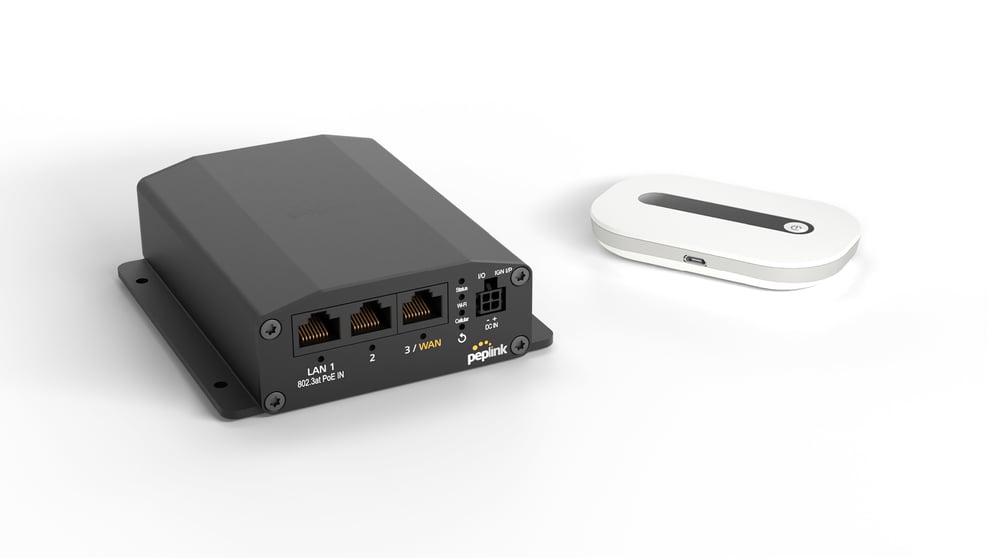Is a mobile router better than a hotspot?
Yes and no!
If you’re wondering which is better, a mobile router or a hotspot, the answer depends on your specific needs and how you intend to use it. Both devices allow you to connect to the Internet on the go, but that’s where the similarities end. Read on to learn about the differences and find out which device is right for you.
What is a mobile router?
A mobile router, often referred to as a portable router or travel router, is a compact networking device that allows multiple devices to share the same Internet connection simultaneously. Like portable hotspots, mobile routers typically use cellular data networks like 4G LTE or 5G to provide Internet access to WiFi devices like smartphones, tablets, and laptops. 5G mobile routers and 4G LTE routers are often used when a reliable Internet connection is required, but traditional wired connections are not available or practical.
What is a hotspot?
A mobile hotspot, or MiFi, is a portable hardware device that converts mobile broadband signals into a WiFi connection for laptops, tablets, phones, and other wireless devices for Internet on the go. A limited number of devices, often up to 15, can use a hotspot simultaneously to connect to the Internet. Hotspots are generally designed for two main things – ease of use and portability. Because they’re battery powered and lightweight, you can carry them virtually anywhere and use them to connect your devices to WiFi in a few clicks.
What’s the difference between cellular mobile routers and hotspots?

Here are some of the key differences between mobile routers and hotspots:
Coverage and Range
Mobile cellular routers typically have more powerful antennas and can provide a stronger and more extensive Wi-Fi signal. They also tend to work better in areas where cellular coverage may be spotty. They are suitable for larger areas or situations where multiple devices need to connect simultaneously.
Hotspots are generally smaller and more compact and have a shorter WiFi range than mobile routers. So individuals or small groups need to be relatively close to a hotspot to connect to the Internet. As they’re not as powerful as SIM routers, [link to new SIM router page] they’re useful when you only need a small amount of data and don’t require the fastest Internet speeds. Because they usually come with service plans that have data restrictions, you wouldn’t want to replace your home Internet with a hotspot.
Number of Connected Devices/Connections
Mobile routers can support more simultaneous connections than hotspots can, making them a better choice if you need to connect multiple laptops, smartphones, tablets, or other devices at the same time.
Hotspots are often limited in the number of devices that can connect simultaneously, which can vary depending on the specific device and plan. While they can typically handle a few devices, they may not be ideal when you need to provide Internet access to a large group of people.
Power
Mobile routers tend to plug into car/mobile power or have batteries, which is important when you’re away from a power source for an extended period of time. They’re designed to be used for extended periods without needing frequent recharging.
Hotspots usually have batteries and are more compact. They’re designed for occasional use and shorter usage periods, and may require more frequent recharging.
Data Plans and Cost
Mobile routers typically require a SIM card from a cellular service provider to access the Internet. SIM card routers may have higher data caps and be more cost-effective for heavy data users.
Hotspots are available with various data plans and may offer limited data, making them more suitable for occasional use or situations where lower data usage is expected.
Portability
Mobile routers are less portable than hotspots, so are better suited for situations where you can carry a bag or backpack.
Hotspots are compact and easily fit in your pocket, making them highly portable and convenient for quick and casual Internet access on the go.
Additional Features
Mobile routers often come with additional features, such as Ethernet ports for wired connections and the ability to share Internet connections with devices that don’t support WiFi; external antenna ports for better signal reception; and advanced network management options like VPN passthrough, firewalls, and quality of service (QoS) settings. Some mobile routers are also designed for specific use cases, such as in vehicles or for outdoor activities.
Hotspots are usually more straightforward and focused on providing basic wireless Internet access, so they usually lack Ethernet ports and advanced networking features found in mobile routers.
Final thoughts
While both mobile routers and hotspots offer mobile Internet access, mobile routers are ideal when you need to connect multiple devices, require longer usage, or need additional features. Hotspots, on the other hand, are better when you need casual, mobile Internet access for a limited number of devices. The right one for you depends on your specific needs and preferences.
Discover the benefits of Peplink mobile routers

Peplink is one of the most trusted providers of 4G and 5G mobile routers and modems in the world. With significantly higher signal quality than any mobile hotspot, Peplink mobile routers are the ideal choice for businesses that depend on solid yet flexible Internet connections.
Explore Peplink mobile routers
Contact Peplink to discuss what type of router is right for you
Additional topics to explore:
What is the best cellular router?
How to pick the best 5G router
What is the difference between an LTE and 4G Router?
.